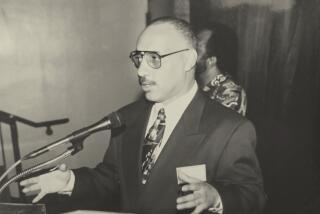Max Schneier, 85; Staunch Advocate for the Mentally Ill
- Share via
Max Schneier, whose daughter’s mental problems turned him into an internationally known advocate for improved treatment and prompted him to create innovative halfway house programs in New York and Los Angeles, has died. He was 85.
Schneier, who spent several years in semi-retirement in Southern California, died of natural causes Monday in Lauderhill, Fla.
A dress manufacturer in New York’s garment district, he became concerned about and involved in mental health treatment in 1969. His youngest daughter, Denise, had been diagnosed with bipolar disorder during her freshman year in college, and was about to be discharged from a mental hospital with no place to go and no public help available.
He organized patients’ parents into a powerful lobbying group to demand more money for public facilities to treat the mentally ill. In 1972, he smuggled a young ABC reporter named Geraldo Rivera into New York’s Willowbrook State School for the Retarded to expose conditions there, forcing the facility’s closure and focusing national attention on problems permeating the mental health system.
Turning his garment business over to a son in order to become a full-time mental health advocate, Schneier helped found the National Alliance for the Mentally Ill in 1979, and created his own Transitional Living Centers--halfway houses for ex-hospital patients returning to the community--in Hawthorne and the New York borough of Queens.
The Southern California facility, which won a state Supreme Court ruling rejecting neighbors’ objections to its presence, initially supervised about 70 young adults diagnosed with chronic schizophrenia. The “clients” lived in private South Bay homes and apartments supervised by Schneier’s counselors, and attended daily classes and workshops designed to help them relearn the basic skills of daily living--from dressing and talking to others to using the public bus system--and perhaps become employable.
At a time when California and other states were vastly reducing the numbers of hospitalized mental patients in favor of community-based treatment, Schneier’s program answered a crying need and won general praise from authorities. Others criticized Schneier for failing to meet his original estimates of patient job placements, which he had predicted would be “even better” than the 52% achieved in his Queens operation.
After three years of running his Southland center here, Schneier told The Times in 1982: “The mistake people make is that somehow they get the idea that most of these people can be restored to competitive employment. The legitimate end and purpose is to help these people lead happier lives. We’d be lucky to get 7% or 8% restored to competitive employment.”
Dr. Kenneth Parker, in a statement on behalf of the board of Transitional Living Centers of Los Angeles County, said Schneier “was a pioneer, a tireless crusader and preeminent advocate on behalf of the chronic mentally ill.... He founded programs ... based on what has come to be known and widely accepted as the psychosocial rehabilitation model. His programs were the forerunners for the best that the public mental health system offers today. His boundless energy was an inspiration to an entire generation of clients, parents, advocates and providers.”
While Schneier was living in the Los Angeles area, he earned a law degree in his late 60s at the University of West Los Angeles.
The volunteer crusader received numerous awards for his dedicated efforts, including the Irving Blumberg Human Rights Award from a unit of the United Nations’ World Health Organization in 1995.
At the time, Leonard Rubenstein, director of the Bazelon Center for Mental Health Law in Washington, D.C., told an interviewer: “Max is a gift. He has a wonderful way of latching onto an important issue that no one else has found and forcing everyone, through his persistence, to pay attention to it.”
The international award was presented shortly after Schneier’s second wife, Suzanne, who worked with him in his cause despite her own mental health problems, committed suicide. Schneier was so upset by her death that he considered abandoning his work, but rallied and remained a staunch advocate for the mentally ill until his own death.
In 1997, the federal Substance Abuse and Mental Health Services Administration established an annual employee award and an internship in Schneier’s honor, hailing him as “a leading advocate of quality rehabilitative services in the area of mental health, especially for those dually diagnosed with mental and substance abuse disorders.” Schneier served on the agency’s national advisory council for four years and was a member of the Joint Commission on Accreditation of Health Care Organizations. He fought for high standards in private psychiatric hospitals and greater representation of consumers’ and patients’ families on accrediting committees.
Twice widowed, Schneier is survived by four children from his first marriage, Deborah Bassman of Hollywood, Fla.; Denise Schneier-Coke of Baltimore; David of Odessa, Ukraine; and Jeffrey of Lancaster, Pa.; a brother, Dr. Monroe Schneier of Pennsylvania; 10 grandchildren; and nine great- grandchildren.
The family has asked that any memorial donations be sent to the Max and Suzanne Schneier Memorial Trust Fund of the Broward Alliance for the Mentally Ill Inc., 6193 Rock Island Road, No. 313, Tamarac, FL 33319.
More to Read
Sign up for Essential California
The most important California stories and recommendations in your inbox every morning.
You may occasionally receive promotional content from the Los Angeles Times.













